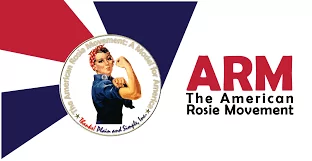Today’s times call for heroes of a different kind – not limelighters, but people who help us all to do the right thing together, do it well and share what they did.
I suggest that we consider that groups, not just individuals, are heroes. Further, these groups should include women, children, seniors, and others who have huge value to society as we learn to have more respect for cooperation as well as competition.
Most of all, we need to start showing off our human family’s strengths, not just our weaknesses, as mass media does so often. We need to find ways to use our ability to heal, not just harm. We need to be better at showing our ability to learn, adapt, and get things done that should be done.
What does this have to do with Rosie, you ask?
I answer everything. Rosies were millions of workers who cared about quality and the end result, which was to keep our freedoms. During WWII it was – and still is – very rare for a Rosie to want to be seen as a special person. They reflected the principle of “E Pluribus Unum” – unity from many.
Back then, people reflected on what really mattered. They recognized that we could not take our blessings for granted. Today, we need to see that the Rosies are proof that people can work together to do quality work in a cooperative spirit.
I fully recognize the difficulty of reaching unity. As I have worked with many Rosies in many communities in the US and other countries over the last 14 years, I’ve seen that people need five conditions in order to unite to achieve a highly workable, goal-oriented project. I will tell you about these five conditions soon.
For now, I say, “Thanks, plain and simple, to Gilmer County High School in Glenville, West Virginia, and the many people from many places who joined together to acknowledge that the deeper, lasting meaning of Rosies was beautifully expressed by them on October 19th. The outstanding celebration of being the first school in America to name schoolrooms for Rosies was outstanding – so outstanding that I can say that I have attended none done better in my lifetime of 83 years.
I am especially pleased that this school of 450 students in a quiet, modest town in Appalachia achieved what I have been working toward since I interviewed Rosie for the first time, in 2008.
This is not to say that people with power and influence do not matter. That would be foolish, we need power and influence, so long as it helps “we the people” to build from our human strengths to find ways to face new problems together.
To quote Thomas Payne:
“The times have found us1”
To quote Nancy Sipple, a Rosies I loved working with,
“We pulled together then. We can do it again. It’s our only hope!”
